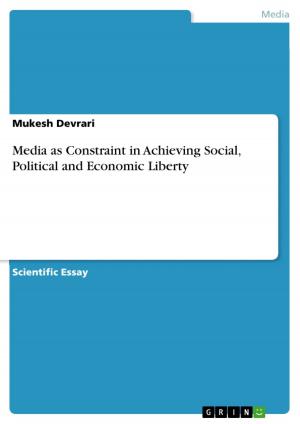A Response to Huntington´s 'Clash of Civilizations': Civilizations vs Nation State
Nonfiction, Social & Cultural Studies, Political Science, International, Foreign Legal Systems| Author: | Patrick Lubjuhn | ISBN: | 9783638514781 |
| Publisher: | GRIN Verlag | Publication: | June 29, 2006 |
| Imprint: | GRIN Verlag | Language: | English |
| Author: | Patrick Lubjuhn |
| ISBN: | 9783638514781 |
| Publisher: | GRIN Verlag |
| Publication: | June 29, 2006 |
| Imprint: | GRIN Verlag |
| Language: | English |
Essay from the year 2005 in the subject Politics - Political Systems - General and Comparisons, grade: 1,7, University of Münster, 7 entries in the bibliography, language: English, abstract: Samuel P. Huntington was born in 1927 and is at the moment director of the John- Olin Institute for strategic studies at the University of Harvard. He was the author of an article, first published in the Foreign Affairs magazine, which has, according to Russel, Oneal and Cox ( 2000, p.584) 'turned into one of the most influential recent books on international relations'. This article was called 'the Clash of Civilizations?' and afterwards was extended (in 1996) to his book, called 'The Clash of Civilizations and the Remaking of the World Order'. This book was meant to be seen as a response to his highly polarising and provocative article mentioned above. In it, he tries to give answers to the questions which arose from his article and tries to clarify his standpoints and claims to underpin his thesis. Samuel P. Huntington has given new currency to the notion of a clash of civilizations. His 1993 article on the topic in Foreign Affairs and his book following this article has gained a global audience. Huntington argues that the bipolar division of the world based on ideology is no longer relevant. The world was entering a new period of intense conflict among civilizations. He states: 'It is my hypothesis that the fundamental source of conflict in this new world will not be primarily ideological or primarily economic. The great divisions among humankind and the dominating source of conflict will be cultural. Nation states will remain them most powerful actors in world affairs, but the principal conflicts of global politics will occur between nations and groups of different civilizations. The clash of civilizations will dominate global politics. The fault lines between civilizations will be the battle lines of the future.' (Huntington, 1993, p.22) In trying to understand the causes of actual events like the 9/11 terror attacks on the United States of America many authors have turned to Samuel P. Huntington's provocative and controversial thesis of a 'clash of civilizations'. In the following part of my essay I am going to comment on his main issues, presenting the main thesis and his general claims of his book and article, dealing with a possible 'clash of civilizations'.
Essay from the year 2005 in the subject Politics - Political Systems - General and Comparisons, grade: 1,7, University of Münster, 7 entries in the bibliography, language: English, abstract: Samuel P. Huntington was born in 1927 and is at the moment director of the John- Olin Institute for strategic studies at the University of Harvard. He was the author of an article, first published in the Foreign Affairs magazine, which has, according to Russel, Oneal and Cox ( 2000, p.584) 'turned into one of the most influential recent books on international relations'. This article was called 'the Clash of Civilizations?' and afterwards was extended (in 1996) to his book, called 'The Clash of Civilizations and the Remaking of the World Order'. This book was meant to be seen as a response to his highly polarising and provocative article mentioned above. In it, he tries to give answers to the questions which arose from his article and tries to clarify his standpoints and claims to underpin his thesis. Samuel P. Huntington has given new currency to the notion of a clash of civilizations. His 1993 article on the topic in Foreign Affairs and his book following this article has gained a global audience. Huntington argues that the bipolar division of the world based on ideology is no longer relevant. The world was entering a new period of intense conflict among civilizations. He states: 'It is my hypothesis that the fundamental source of conflict in this new world will not be primarily ideological or primarily economic. The great divisions among humankind and the dominating source of conflict will be cultural. Nation states will remain them most powerful actors in world affairs, but the principal conflicts of global politics will occur between nations and groups of different civilizations. The clash of civilizations will dominate global politics. The fault lines between civilizations will be the battle lines of the future.' (Huntington, 1993, p.22) In trying to understand the causes of actual events like the 9/11 terror attacks on the United States of America many authors have turned to Samuel P. Huntington's provocative and controversial thesis of a 'clash of civilizations'. In the following part of my essay I am going to comment on his main issues, presenting the main thesis and his general claims of his book and article, dealing with a possible 'clash of civilizations'.















